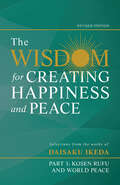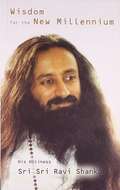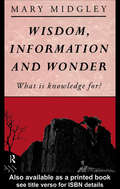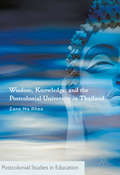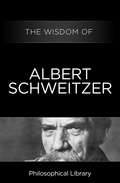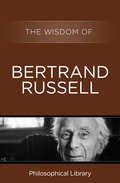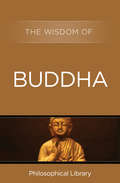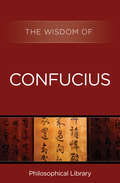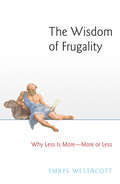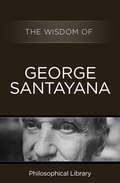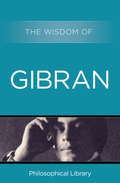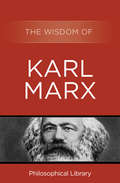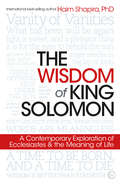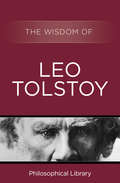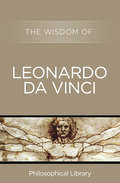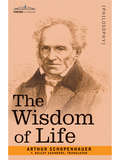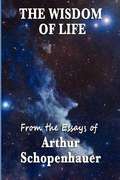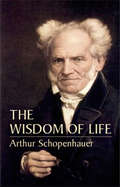- Table View
- List View
The Wisdom for Creating Happiness and Peace, Part 3: Kosen-rufu and World Peace, Rev. Ed.
by Daisaku IkedaGleaned from more than fifty years of Daisaku Ikeda' s works, thisrevised edition adds new selections that further provide a windowinto the SGI president' s thought and philosophy. His words are aboundless source of inspiration, hope, and courage for a worldincreasingly beset with sorrow and suffering.Chapters in this volume:“ A Life Dedicated to Kosen-rufu” “ The Mission and Vow of the Bodhisattvas of the Earth” “ Valuing Each Individual” “ The Organization for Kosen-rufu” “ The Unity of 'Many in Body, One in Mind'” “ Leaders Who Guide Others to Happiness” “ The Mentor-Disciple Relationship Is the Heart of the Soka Gakkai” “ The Three Founding Presidents and the Path of Mentor and Disciple” “ A Religion That Exists for People's Happiness” “ The Future Division— The Treasure of the Soka Gakkai” "The Great Path to World Peace" "Conclusion: Toward the Future"
Wisdom for the New Millennium
by Sri Sri Ravi ShankarA book by Indian Spiritual Guru Sri Sri Ravishankar, it is a book for self improvement as well and talks about how to live a happy stress free life.
Wisdom, Information and Wonder: What is Knowledge For?
by Mary MidgleyIn this book one of Britain's leading philosophers tackles a question at the root of our civilisation: What is knowledge for? Midgley rejects the fragmentary and specialized way in which information is conveyed in the high-tech world, and criticizes conceptions of philosophy that support this mode of thinking.
Wisdom, Knowledge, and the Postcolonial University in Thailand (Postcolonial Studies in Education)
by Zane Ma RheaThis book examines Thai knowledge and wisdom from the perspective of postmodern, postcolonial globalization. Ma Rhea explores the ways in which the Thai university system attempts to balance old knowledge traditions, Buddhist and rural, with new Thai and imported knowledge. It traces the development of Thai university partnerships with outsiders, focusing on the seventy year relationship between Thailand and Australia. In comparison, it analyses the old Thai Buddhist wisdom tradition and in the final chapters proposes its worthiness as a pedagogical pathway for universities globally.
The Wisdom of Albert Schweitzer (Wisdom)
by The Wisdom SeriesReverence for Life—Albert Schweitzer&’s pivotal philosophyMusician, physician, humanitarian, and philosopher, Albert Schweitzer was a twentieth-century Renaissance man who won the Nobel Peace Prize for his &“Reverence for Life&” philosophy. The Wisdom of Albert Schweitzer explores this core philosophy, which inspired one of the world&’s great humanitarians. While traveling in Africa, Schweitzer recognized that all living creatures have a will to live and believed that through a &“reverence for life&” mankind had an ethical imperative to aid in the welfare of all living things, including the environment. His words have remained an inspiration for generations of humanitarians and environmentalists.
The Wisdom of Albert Schweitzer (Wisdom)
by The Wisdom SeriesReverence for Life—Albert Schweitzer&’s pivotal philosophyMusician, physician, humanitarian, and philosopher, Albert Schweitzer was a twentieth-century Renaissance man who won the Nobel Peace Prize for his &“Reverence for Life&” philosophy. The Wisdom of Albert Schweitzer explores this core philosophy, which inspired one of the world&’s great humanitarians. While traveling in Africa, Schweitzer recognized that all living creatures have a will to live and believed that through a &“reverence for life&” mankind had an ethical imperative to aid in the welfare of all living things, including the environment. His words have remained an inspiration for generations of humanitarians and environmentalists.
The Wisdom of Bertrand Russell (Wisdom)
by The Wisdom SeriesAn A-to-Z compendium of Russell&’s writingOne of the great minds of the twentieth century, Bertrand Russell explored philosophy, mathematics, and a variety of other intellectual, political, historical, and social issues in his lifetime. In this indispensable and easily accessible guide, drawn from his books and essays, readers will find Russell&’s fundamental principles, from objectivity to ontological arguments to logical certainty, in his own words. Russell also explored topics such as war, evil, and the purpose and goal of human existence. Russell&’s intellect transcends time and remains a relevant source of inspiration and thought today.
The Wisdom of Bertrand Russell (Wisdom)
by The Wisdom SeriesAn A-to-Z compendium of Russell&’s writingOne of the great minds of the twentieth century, Bertrand Russell explored philosophy, mathematics, and a variety of other intellectual, political, historical, and social issues in his lifetime. In this indispensable and easily accessible guide, drawn from his books and essays, readers will find Russell&’s fundamental principles, from objectivity to ontological arguments to logical certainty, in his own words. Russell also explored topics such as war, evil, and the purpose and goal of human existence. Russell&’s intellect transcends time and remains a relevant source of inspiration and thought today.
The Wisdom of Buddha: The Wisdom Of The Torah, The Wisdom Of The Talmud, The Wisdom Of The Koran, The Wisdom Of Muhammad, And The Wisdom Of Buddha (Wisdom)
by The Wisdom SeriesDiscover the origins of Buddhism and its tenets from the seminal texts Drawn from the sacred books of Buddhism, this collection reveals the insights and beliefs at the heart of the world&’s fourth-largest religion. Siddhartha Guatama, a sixth-century Hindu warrior prince, renounced the world in his search for the meaning of life and became the Buddha, or &“Enlightened One,&” while meditating at Bodh Gaya. From that moment forward the Buddha sought to share his own enlightenment with all of mankind. Through the Four Noble Truths and the Noble Eightfold Path, the Buddha taught followers to let go of desire and worldly attachments in order to alleviate suffering while embracing practices of meditation, mindfulness, and right conduct. Covering the birth and death of the Buddha, as well as the major tenets of Buddhism, including karma and the middle doctrine, The Wisdom of Buddha offers a profound view of the Buddhist religion and its founder.
The Wisdom of Confucius (Wisdom)
by The Wisdom SeriesHundreds of sage observations from China&’s most revered scholar Teacher, politician, philosopher, and student, Confucius offered wisdom and aphorisms on a variety of topics that transcend borders and time. Whether considering his own life, human nature, or a society&’s responsibilities, Confucius&’s teachings emphasize personal and governmental morality, correctness of social relationships, justice, and sincerity. He aimed to effect social and political reform, and left a legacy of wisdom that remains true today. Organized by topic and accompanied with contextual footnotes, this collection of quotes, sayings, and lessons is often as entertaining as it is educational.
The Wisdom of Confucius (Wisdom)
by The Wisdom SeriesHundreds of sage observations from China&’s most revered scholar Teacher, politician, philosopher, and student, Confucius offered wisdom and aphorisms on a variety of topics that transcend borders and time. Whether considering his own life, human nature, or a society&’s responsibilities, Confucius&’s teachings emphasize personal and governmental morality, correctness of social relationships, justice, and sincerity. He aimed to effect social and political reform, and left a legacy of wisdom that remains true today. Organized by topic and accompanied with contextual footnotes, this collection of quotes, sayings, and lessons is often as entertaining as it is educational.
The Wisdom of Frugality: Why Less Is More - More or Less
by Emrys WestacottFrom Socrates to Thoreau, most philosophers, moralists, and religious leaders have seen frugality as a virtue and have associated simple living with wisdom, integrity, and happiness. But why? And are they right? Is a taste for luxury fundamentally misguided? If one has the means to be a spendthrift, is it foolish or reprehensible to be extravagant?In this book, Emrys Westacott examines why, for more than two millennia, so many philosophers and people with a reputation for wisdom have been advocating frugality and simple living as the key to the good life. He also looks at why most people have ignored them, but argues that, in a world facing environmental crisis, it may finally be time to listen to the advocates of a simpler way of life.The Wisdom of Frugality explores what simplicity means, why it's supposed to make us better and happier, and why, despite its benefits, it has always been such a hard sell. The book looks not only at the arguments in favor of living frugally and simply, but also at the case that can be made for luxury and extravagance, including the idea that modern economies require lots of getting and spending.A philosophically informed reflection rather than a polemic, The Wisdom of Frugality ultimately argues that we will be better off--as individuals and as a society--if we move away from the materialistic individualism that currently rules.
The Wisdom of George Santayana (Wisdom)
by The Wisdom SeriesA survey of the influential—and prolific—modern philosopher In dozens of books, magazine articles, and essays, George Santayana infused his philosophy with exquisite language, wit, and subtle humor, prompting one authority to state that he &“writes philosophy more beautifully than any other thinker since Plato.&” The Wisdom of George Santayana makes accessible both his ideas and his oft-quoted aphorisms on a variety of subjects including naturalism, creative imagination, and spirituality without dogma. Organized by books and essays, and highlighting key words and themes, this compilation is an excellent introduction to the man and his work.
The Wisdom of George Santayana (Wisdom)
by The Wisdom SeriesA survey of the influential—and prolific—modern philosopher In dozens of books, magazine articles, and essays, George Santayana infused his philosophy with exquisite language, wit, and subtle humor, prompting one authority to state that he &“writes philosophy more beautifully than any other thinker since Plato.&” The Wisdom of George Santayana makes accessible both his ideas and his oft-quoted aphorisms on a variety of subjects including naturalism, creative imagination, and spirituality without dogma. Organized by books and essays, and highlighting key words and themes, this compilation is an excellent introduction to the man and his work.
The Wisdom of Gibran (Wisdom)
by The Wisdom SeriesAn A-to-Z guide to the mystic poet&’s maxims and aphorisms An early twentieth-century Lebanese-American writer, Khalil Gibran instilled his poetry and art with his experiences in both the East and West. This selection of quotes, maxims, and aphorisms is drawn from such poems as &“Secrets of the Heart,&” &“Spirits Rebellious,&” and &“Broken Wings,&” as well as from his autobiography and essays. Gibran&’s words express a strong spirituality and mysticism and his voice offers a direct and at times optimistic view of the brotherhood of man. Addressing everything from love and death to Jesus, motherhood, and nature, Gibran&’s wisdom remains thought provoking and inspirational.
The Wisdom of Gibran (Wisdom)
by The Wisdom SeriesAn A-to-Z guide to the mystic poet&’s maxims and aphorisms An early twentieth-century Lebanese-American writer, Khalil Gibran instilled his poetry and art with his experiences in both the East and West. This selection of quotes, maxims, and aphorisms is drawn from such poems as &“Secrets of the Heart,&” &“Spirits Rebellious,&” and &“Broken Wings,&” as well as from his autobiography and essays. Gibran&’s words express a strong spirituality and mysticism and his voice offers a direct and at times optimistic view of the brotherhood of man. Addressing everything from love and death to Jesus, motherhood, and nature, Gibran&’s wisdom remains thought provoking and inspirational.
The Wisdom of Karl Marx (Wisdom)
by The Wisdom SeriesAn A-to-Z reference of the great social reformer&’s own words Among modern philosophers, few have had a greater impact on history than Karl Marx. Now this easy-to-use introduction to the nineteenth-century theorist breaks down his work into definitions of his terms and concepts, including Bourgeois State, Classless Society, and Freedom of the Press. Accompanied by an insightful introductory essay that puts the included excerpts from his works in context, The Wisdom of Marx is essential reading for an understanding of the man whose work incited far-reaching social and economic change.
The Wisdom of Karl Marx (Wisdom)
by The Wisdom SeriesAn A-to-Z reference of the great social reformer&’s own words Among modern philosophers, few have had a greater impact on history than Karl Marx. Now this easy-to-use introduction to the nineteenth-century theorist breaks down his work into definitions of his terms and concepts, including Bourgeois State, Classless Society, and Freedom of the Press. Accompanied by an insightful introductory essay that puts the included excerpts from his works in context, The Wisdom of Marx is essential reading for an understanding of the man whose work incited far-reaching social and economic change.
The Wisdom of King Solomon: A Contemporary Exploration of Ecclesiastes and the Meaning of Life
by Haim ShapiraIn the Book of Ecclesiastes the main character, already rich in material wealth, seeks wisdom and looks upon the lessons of his own life. Inspired by that search, bestselling philosopher Haim Shapira muses on the perennial questions most relevant to our lives.Ecclesiastes is among the most poetic books of the Old Testament, full of famous and resonant verses: 'Vanity of vanities, all is vanity'; 'A time to weep and a time to laugh, a time to mourn and a time to dance'; 'I have seen all the things that are done under the sun; all of them are meaningless, a chasing after the wind'. It is traditionally attributed to King Solomon (r. 970-930 BC), who advises us to avoid seeking happiness in worldly things and focus instead on the eternal truths.The book poses many vital questions: Is life nonsense and suffering or bliss? Is there any meaning to our actions under the sun? What will happen at the end? Is there any advantage to wisdom? Why can't a just regime be established? What are the relationships between happiness and wealth? What is the source of emotions and what do we know about desires? Can knowledge of death serve as a guide to life? King Solomon does not instruct us to think like him, nor does he guide us towards a particular path. Ecclesiastes sends us on a journey into The Valley of Great Questions: Abel, man, world, labor, advantage, sun, goodness, time, light, evil spirit, wisdom, love, fear of God, death, and more...Haim Shapira's rich and rigorously informed analysis allows King Solomon's voice to speak to us across the millennia, offering remarkably up-to-the-minute insights for people of all faiths and none. If you want advice about living a better life (and to learn about the meaning of life), would it not be wise to receive it from King Solomon – the wisest man of all time?
The Wisdom of Leo Tolstoy (Wisdom)
by The Wisdom SeriesFollow the renowned novelist&’s journey to his own peace Leo Tolstoy was born to an aristocratic Russian family, became a world-famous influential novelist, and then chose to lead the simple life of a peasant. Dating from this last part of his life, Tolstoy&’s influential book, What I Believe, takes readers along on the path to a life modeled literally on Jesus Christ&’s &“Sermon on the Mount&” and the teachings of the Gospels. In revealing and frank essays he reimagines a faith without dogma, centered solely on Jesus&’s doctrine of love, humility, and self-denial. This collection of chapters from What I Believe includes examinations of Resist Not Evil, Judge Not Thy Neighbor, Letting Go of Fear, and Allowing Forgiveness.
The Wisdom of Leo Tolstoy (Wisdom)
by The Wisdom SeriesFollow the renowned novelist&’s journey to his own peace Leo Tolstoy was born to an aristocratic Russian family, became a world-famous influential novelist, and then chose to lead the simple life of a peasant. Dating from this last part of his life, Tolstoy&’s influential book, What I Believe, takes readers along on the path to a life modeled literally on Jesus Christ&’s &“Sermon on the Mount&” and the teachings of the Gospels. In revealing and frank essays he reimagines a faith without dogma, centered solely on Jesus&’s doctrine of love, humility, and self-denial. This collection of chapters from What I Believe includes examinations of Resist Not Evil, Judge Not Thy Neighbor, Letting Go of Fear, and Allowing Forgiveness.
The Wisdom of Leonardo da Vinci (Wisdom)
by The Wisdom SeriesAn intriguing look inside the mind of the Renaissance genius Leonardo da Vinci stood on a bridge between medieval thought and the modern mind. In this selection of entries from his dozens of coded notebooks and unpublished manuscripts, his unending curiosity in the universe and deep knowledge come through in his energetic style. The self-educated da Vinci developed a philosophical system that set him apart from his contemporaries and marked him as the oracle of a new age, and his vivid imagination and straightforward writing style capture the reader&’s attention whether he is writing about his scientific analysis, his opinion of necromancy, discoveries in nature, or the nature of man. Accompanied by a thorough introduction, The Wisdom of Leonardo da Vinci unveils the man&’s deepest thoughts and musings and proves why he remains an intriguing and enduring figure.
The Wisdom of Life
by Arthur SchopenhauerA disciple of Kant and a significant factor in shaping Nietzsche's thinking, Arthur Schopenhauer worked from the foundation that all knowledge derives from our experience of the world, but that our experience is necessarily subjective and formed by our own intellect and biases: reality, therefore, is but an extension of our own will. In this essay, translated by THOMAS BAILEY SAUNDERS (1860-1928) and first published in English in the 1890s, Schopenhauer explores concepts of what internal driving forces and external interpersonal dynamics contribute to the individual's happiness, from our own personalities to our wealth and social standing. The datedness of some of Schopenhauer's ideas--including a decidedly prefeminist interpretation of women's choices and a connection between fame and reputation that is no longer always active in our celebrity culture--only serve to highlight the philopher's basic assumption of human life: that it is characterized chiefly by misery. Students of philosophy and of 19th-century intellectualism will find this a fascinating read.
The Wisdom of Life
by Arthur SchopenhauerIn this essay from Schopenhauer's final work, Parerga und Paralipomena (1851), the philosopher favors individual strength of will and independent, reasoned deliberation over the tendency to act on irrational impulses. He examines the ways in which life can be arranged to derive the highest degree of pleasure and success
The Wisdom of Life: Being The First Part Of Aphorismen Zur Lebenswiesheit (Mobi Classics Ser.)
by Arthur SchopenhauerA leading German metaphysician of the 19th century, Arthur Schopenhauer (1788–1860) exerted an influence far beyond the hermetic world of philosophy, with adherents ranging from Richard Wagner and Friedrich Nietzsche to Leo Tolstoy and Thomas Mann. Among Schopenhauer's chief contributions to the field of philosophy are his rejection of the idealism of his contemporaries and his embrace of a practical variety of materialism. He jettisons the traditional philosophic jargon for a brisk, compelling style that employs direct terms to express the metaphysics of the will.In The Wisdom of Life, an essay from Schopenhauer's final work, Parerga und Paralipomena (1851), the philosopher favors individual strength of will and independent, reasoned deliberation over the tendency to act on irrational impulses. He examines the ways in which life can be arranged to derive the highest degree of pleasure and success, presents guidelines to achieving this full and rich manner of living, and advises that even a life well lived must always aspire to grander heights. Abounding in subjects of enduring relevance, Schopenhauer's highly readable work appears here in an excellent translation.
